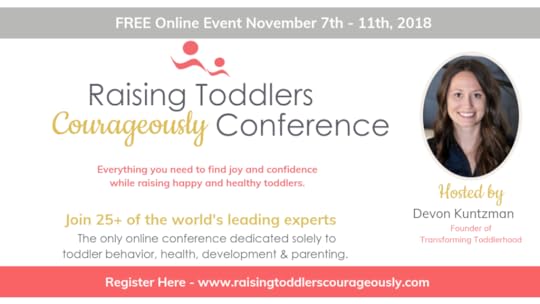Roma Khetarpal's Blog, page 9
January 10, 2019
The Perfect Parent is now in Korean!
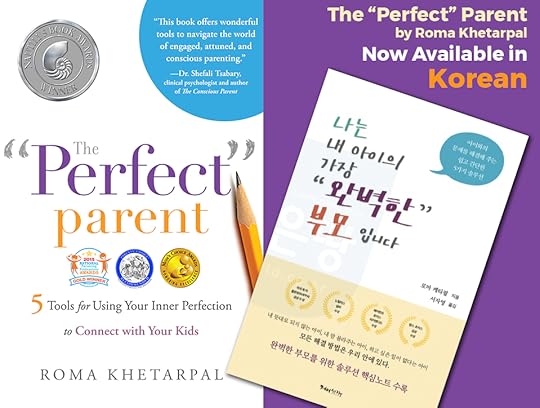
The “Perfect” Parent is now in Korean!
You never know where things will lead.
I hardly imagined that a book I wrote out of a personal passion would not only benefit parents but would also win a number of awards and become a template for an educational program for school districts. And to have the book available in two other languages…who would have thought?
Last year, as you may remember, The Perfect Parent was translated into Simplified Chinese and became available in online bookstores and brick-and-mortar stores in China. When my publisher sent me my first copy, it felt like I had another child—but in a different country! This is so cool, I thought. I even wrote a post about the need for mindful parenting in the Chinese community.
Then my publisher approached me about Korean rights to my book. At that point, I wasn’t really concerned about the terms of the sale. I was simply fulfilled by knowing that my message was part of a parenting shift in Korea—a country where for centuries “tiger moms” and “eagle dads” have raised children with success and discipline as their only focal points.
If the message in my book can change that outlook in one family and affect one child’s life, I would consider my purpose with Tools Of Growth well served. I know that books like these offer an invitation to step into parenting with equality, equanimity, and affection, and I am excited to be part of this evolution!
Last Saturday I received my first copy of The “Perfect” Parent in Korean, and when I opened the package, it was fulfilling to think, yes, here it is in yet another language. I admit paging through the book was a little surreal, though, since certain areas are highlighted in a rather unusual way. I’m assuming that the highlights are key messages. The toolbox looked the same, however. I guess that, given the speed of parenting life in our global culture, a toolbox is valuable wherever you are. Next week a Korean friend will help me delve into these mysteries a bit more, and I’ll share what we find out.
I want to thank JAYSEOGA Publishing House for its interest in this project and thanks, too, to Kyobo and Yes24 bookstores for carrying and distributing this book.
Purchase from Yes24
Purchase from Kyobo
I feel that authorship is first and foremost a self-fulfilling commitment. You write because you love the art of it. But when an audience starts to form, and people start to resonate with, follow, implement, and share your message—especially in parenting—a serious sense of responsibility sets in. I am grateful for this responsibility, which each of you who follow and advocate my work has bestowed on me. Thank you all for magnifying the passion that goes into my work and helping spread the message across the globe—all the way to China and Korea!
The post The Perfect Parent is now in Korean! appeared first on Tools of Growth.
January 1, 2019
Connection: The Only New Year’s Parenting Resolution You Need to Make
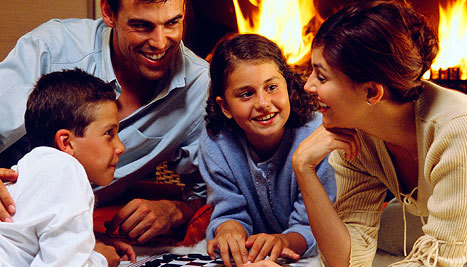
Hundreds of parenting resolutions are splattered all over social media. Two that have caught my attention repeatedly are “spend more time with my kids” and “yell less.” To me, both of these really scream a desire for connection. And it’s true. We want nothing more than a deeper or stronger connection with our kids.
When we lack that connection—because we are not spending enough time with them or the time that we spend with them is filled with yelling and arguments—our conscience tugs at us, and we’re burdened by guilt, which then leads us to make promises and resolutions like the ones above.
But, alas, researchers at the University of Pittsburgh have hypothesized that it’s positive habits more than a determined mind-set that are the real key to achieving long-term goals. Moreover, only 19 percent of people are successful in reaching their goals over the span of two years! Yikes! That might be okay if your resolution pertains to exercising more or self-care. But when it comes to our kids, we cannot fail them. How then can we guarantee a 100 percent success rate in connecting with our kids?
Here are two simple tricks:
Take 5: Spend 5 minutes a day with your kids doing nothing—no-thing. I cannot stress enough the bond that this tool will help create between you and your child. It is this simple. Connection is the product of quiet time spent together. Not time spent running errands or driving to activities, but time spent doing nothing. This does not mean that you need to sit quietly, which is almost impossible for young children. It simply means spending time together in a quiet space, perhaps out in nature. It could be sitting on the balcony of your apartment, in your backyard, on the front doorstep, or in a nearby park. Find a quiet spot that helps quiet the mind. It’s a guaranteed way to deepen connection.
Respect your kids: No matter how young or old they are and no matter if they’re wrong or right, respect your kids as you would want them to respect you. No exceptions, no buts, no ifs. Talk to your kids respectfully— no poking, no sarcasm, no foul language, no authoritarian tone of voice, and never ever an “I told you so” or “because I said so.” Even if they are being disrespectful. You cannot fight fire with fire—we all know that. Yet, in the heat of the moment, it is the mistake that most parents make. So check your emotional temperature first. If you feel like you’re losing it, walk away, take a few breaths, or simply tell your child that you’re upset and you need a few minutes to gather yourself. Self-management is the best way to show respect, and it’s also the most challenging. Finally, when you’re right, practice being kind first.
Respect is the only voice of love. It is through respect that the ocean of love that we have for our kids is seen, felt, and heard. It is through respect that we can give our love an actual voice. It is through respect we can truly honor our children. This is why Honorable Parenting is the very first chapter of my book, The “Perfect” Parent. Without this foundation, everything you build will be weak and will crumble. There is no deeper way to create a connection—a lasting relationship—with our kids than by showing them the basic respect that is guaranteed to bring out the best in us and in them.
They say there is no magic formula to raising kids. I say that that is not true! Taking five quiet minutes a day and respecting your kids unconditionally is the magic formula to raising kids—connected kids—kids who are connected to themselves, to you and to their siblings, friends, and peers.
If there is any New Year’s resolution that you want to commit to, let it be one that plants the seeds of connection and gives our kids a lifetime skill that will help them succeed and make this world a better place.
Wishing you and your families a Connected 2019!
The post Connection: The Only New Year’s Parenting Resolution You Need to Make appeared first on Tools of Growth.
December 24, 2018
How Christmas Came to Our House
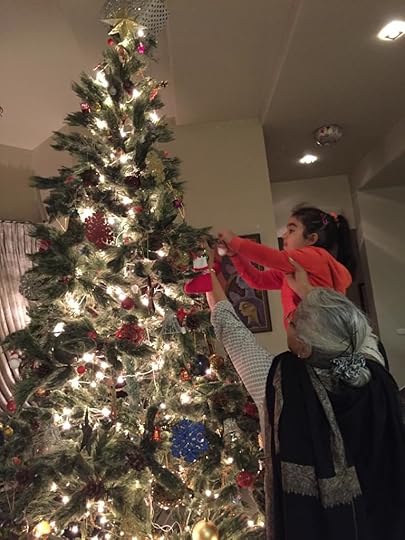
My Aunt and her granddaughter in New Delhi, India
It was January 1993. My then-six-year-old daughter, Nitasha, came home from her first day of school after winter break, completely out of sorts. I knew immediately something was coming.
“Was it fun going back to school after three weeks?” I asked.
“Nope,” she said with arms tightly folded, eyes squinting, forehead wrinkled.
“Oh no. Are you okay? What happened, babloo?” I asked, using her favorite term of endearment, yet giggling inside. How I loved their little problems and being able to help resolve them.
“Well, I’m really mad that we’re not Christian! Why can’t we be Christian? Why do we have to be different than all my friends? Why do Christians have so much fun and we are so boring?” she lamented. Her crackled voice was accompanied by tiny little tears.
“Please tell me more, my love. How do Christians have more fun than we do?” I sat her in my lap and played with her hair, trying to comfort her as she set her head on my chest.
“They get to celebrate Christmas, which is so much more fun than Diwali, and they get to have a tree and presents, and then they all came to school and told all the stories of when Santa came down their chimneys. Santa doesn’t even know who we are or where we live because we are not Christians. Can’t we just go to church and change to be Christian? All my friends even went to church together. I want to go with them!” Now she was sobbing.
“Why do you think only Christians can celebrate Christmas, Nitasha?” I asked. I was dying to know what had been planted in her mind by her peers at school.
“C-H-R-I-S-T is the word and spelling of Jesus Christ, who was born on Christmas Day, and it’s the spelling of Christians and Christmas, Mom. Don’t you know that? You have to be something with a “Christ” for Santa to have your address,” she said, looking me in the eye like I was a dummy-mummy.
When our kids were born, my husband and I had decided that in order not to confuse them, we would celebrate Diwali in our home and celebrate Christmas at the home of my sister-in-law, who had converted to Christianity. That way, she and her family could share her Hindu heritage with us, and my kids would get to celebrate Christmas and be part of the festivities with their cousins. It was a win-win! It was our “modern family” answer to living in California, the melting pot of cultures and religions—a popular term back then. We thought we had it all figured out! Until that day with Nitasha, of course.
After a little more conversation, it seemed to come down to the “shiny, bright tree and lights and presents.” So that’s how a Christmas tree and presents came into our home. I explained to Nitasha that we weren’t going to swap celebrating Diwali for Christmas. But we would have a tree and two presents for the kids to open at Christmas, then we would go to her aunt’s house and celebrate more with the family.
Several of our friends balked at this idea and asked why we had caved, suggesting that this would confuse the kids further. But my husband and I were crystal clear. We were raising our kids here in the West, and if we were not going to answer their confusion with an open mind and open heart—one that aligned with our honoring being human first—then we would confuse our kids.
Today, the word “oneness” is a trendy term. My adult kids celebrate everything with everyone! They invited their partners over for Diwali and went to celebrate Hanukkah with one of those families. And we are all going to celebrate Christmas at another’s. Yesterday, in fact, we face-timed an aunt and uncle in New Delhi, India, who told us they were on their way home from buying Christmas presents for their grandkids to keep under the Christmas tree they had at home. As a human race, we are globally owning the term “Happy Holidays” alongside “Merry Christmas.”
As you gather with your family over the holidays, do share with your children how many races, cultures, and religions are in your family. Let them know you think oneness and inclusiveness melt away our differences and lead us to acceptance, uniting us as a human race. What better holiday celebration than sharing this “JOY” with your families! What a beautiful time of global oneness and inclusiveness we live in!
Wishing all of you and your families a beautiful holiday season.
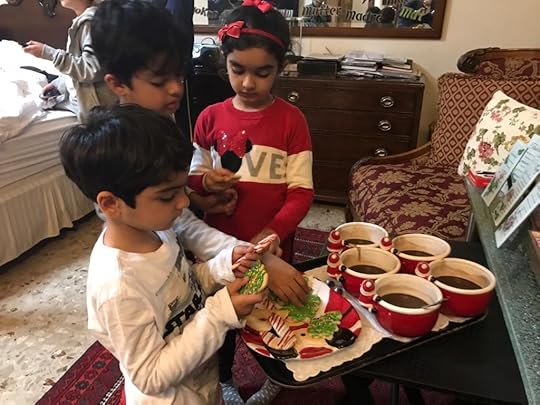
The post How Christmas Came to Our House appeared first on Tools of Growth.
November 27, 2018
The Wedding Dress Trip
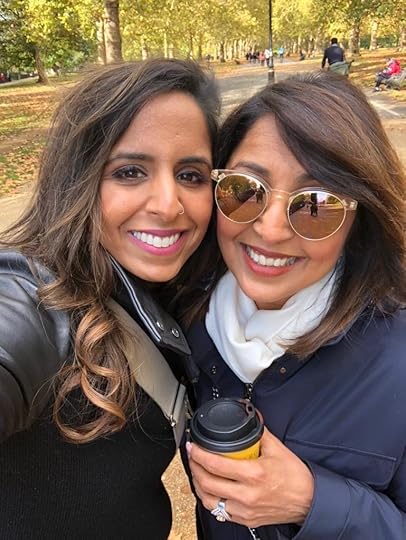
A couple of months ago, after my daughter, Nitasha, got engaged and said she wanted a traditional Indian wedding, she made my heart smile with a simple question: “Mom, it’s always been my dream to go wedding shopping in India! What do you think? Will you come with me?”
Surprised and elated, I leapt for joy, almost as if I were the bride myself! “Yes! Yes!” I cried, “I’m all in.” Nitasha hugged me, we both shed a few tears of joy and love, and the planning began.
For those unfamiliar with Indian weddings, you have to understand that they are full-on, week-long productions—with three main events and three to four smaller ones, each requiring a new elaborate outfit. And while there are many chic Indian boutiques in the Los Angeles area, including dozens up and down Pioneer Boulevard in Artesia (popularly known as Little India), the variety and prices of the wares in India stand alone. If one can take the time off, and has family to stay with, the savings can easily offset the cost of making such a trip. Fortunately, we were able to afford the time and expense to make the trip.
And what a privilege it was to be asked to accompany Nitasha. I’d gone with her to pick out clothes for several engagement events, and I had noticed that more than half of the brides-to-be were shopping with their fiancés, friends, or by themselves. I even overheard one young lady say that she would never be able to shop with her mom. That was probably understandable. Many of these young women were older, more mature, and definitely more independent than those of my generation. I was honored that Nitasha liked spending time with me just as much as I liked spending time with her! There’s certainly a spark of joy when your feelings for your kids boomerang back.
There was another reason for my excitement: I had never actually been wedding shopping before, even for myself! My mom actually did all my wedding shopping for me. I just went from Kuwait (where I was born and raised) to India two weeks before my wedding for all the final fittings. It was the custom then that the mother of the bride picked out the styles, the colors, the jewelry, and all trousseau outfits. And I didn’t question it. That’s just the way things were back then. So it was all the more exciting for me to be part of my daughter’s shopping trip!
During the flight, over a glass of wine, we made a long list of all the things we had to do in New Delhi in just eight days. We landed at 8:30 a.m., and three hours later we were in the first wedding dress store. The next few jet-lagged days were packed with appointments, interspersed with laughter, disagreements, hugs, and catnaps. We soon found our rhythm, and when I didn’t like or agree with something, I practiced self-management and emotional intelligence—reminding myself that this was Nitasha’s time. Evidently, however, my daughter had perfected the art of reading my inner dialogue. I asked her how she knew what I was thinking, and she said, “You take a deep breath when you don’t like something but don’t want to say anything, and your nostrils flare up when you exhale!” We both laughed hard at that. She was so on point!
The eight days flew by faster than we had imagined. Besides wedding shopping, we managed to spend evenings with relatives and even try a couple of really great restaurants. The clothes we picked out would be sent to Los Angeles in time for the wedding next year. We accomplished a lot in a short time, but for me, the defining moment of this trip was during a detour on the way home.
We had scheduled a stop in London to meet Nitasha’s fiance’s maternal grandparents, who hadn’t been able to attend any of the engagement celebrations in the States and were yearning to meet Nitasha. During the long cab ride to their home, Nitasha took my hand and said, “Mom, I will cherish this trip for the rest of my life. I know there were times when I was frustrated or didn’t agree with you, or I was just plain tired, but you carried me through those moments with love and care. I’m so grateful I have you as my mom and friend in this lifetime.” What left me speechless was that I had been thinking the exact same thing about her.
Yes, our kids know us just as well as we know them. They can read us just as clearly as we can read them. They feel us just as strongly as we feel them. And this holds true from the early years to adulthood. If we’re dialed in, connected, and committed to this relationship mindfully and consciously, no matter how old our kids are, we will channel the growth we need to live a joyful life ourselves and pass that legacy along to our children and through them into their relationships and the world around them. This trip I had with Nitasha will be one of my fondest memories of our time spent together. It did take patience and respect, and, yes, it requires dedicated effort on both our parts, but it was oh, so worth it.
The post The Wedding Dress Trip appeared first on Tools of Growth.
November 20, 2018
How to Have a “Delicious” Thanksgiving!

I was at my workout class this morning, and as the instructor was warming us up for this intense 45-minute session, she said, “A lot of people ask me at this time of the year how I manage my weight and fitness with the holiday madness? My answer is always the same: Pre-schedule your workouts for the week, and don’t eat every day like it’s Thanksgiving or Christmas. On the day, I personally have a no-holds-barred policy! Nothing stands in the way of my enjoying the deliciousness of the food. I put way too much effort into my Thanksgiving meal to have it any other way!”
That was encouraging, and it all made sense, but after class, I heard someone say that the only thing that would prevent them from enjoying “Thanksgiving deliciousness” would be “family ugliness.”
I shuddered at the thought of that! After all, if we put into our relationships as much effort as we put into the meal, we would either have no holiday ugliness or we would learn to rise above it. Imagine having the deliciousness of family as an accompaniment to the deliciousness of the repast. Why not shift the focus from the turkey on the table to the people around it? Sure, it will take effort and prep (just like the meal), but the effect will stay with you way past the 12 hours that it takes to digest the bird! It will last a lifetime. Most importantly, you’ll teach your children—by example—to make connection the reason to get together at Thanksgiving!
No turkey filling can be more fulfilling than the opportunities for growth that come from family pulls and tugs. There is no tastier accompaniment than the joy one feels when you value and nurture family connections. So along with your delicious turkey, discover the deliciousness of the family you are enjoying it with, and give thanks for the relationships that we were born with and the ones we have assumed along the way.
A very Happy Thanksgiving to you and your loved ones. We are grateful to have all of you as our TOG family!
The post How to Have a “Delicious” Thanksgiving! appeared first on Tools of Growth.
October 29, 2018
Tips to Help Your Kids Through Tragedy

It is with deep sadness that we are re-posting these tips today. With the horrible shooting at the Tree of Life synagogue in Pittsburgh, we wanted to make sure that you had the tools at your disposal to have these hard conversations with your kids. Hopefully, these tips can be a guide in discussing this tragedy within your family.
Begin a Mindful, Open Discussion: Let kids know that, unfortunately, bad incidents do happen. Find out what your child knows about the event; his or her perception of what has happened may be very different from reality. This article at Today.com gives an age-by-age guide on how to talk to your children about these tragedies.
Don’t hesitate to admit that you don’t have all of the answers. If your child asks a question and you don’t know the answer, the simplest reply might be something like, “I’m sad about the news, and I’m worried just like you are. I love you, and I’m here for you.”
Encourage Your Family to Express Their Feelings: You can complete a Dealing with the Feeling (Spot it, say it, okay it) exercise to open up dialogue. Younger children may not be able to express their feelings about “violence,” but they can discuss how they feel when a classmate is mean to them, and you can get at that with open-ended questions. Share how you feel about shootings so that your children know that what they are feeling is normal. Don’t be afraid to show your emotions (crying, sadness, shock) as well.
Discuss Mindfulness With Your Children: Mindless events like shootings are caused when we do not understand what our inner world looks like. They come from a complete disconnection from oneself and our innate human values of goodness and oneness. Make sure to help your kids develop problem-solving and conflict-resolution skills and to avoid (and report) bullying and other negative communication with peers.
Make Sure Your Kids Feel Safe and Secure: Our children are looking to us for safety. Avoid information overload by limiting their exposure to the disturbing content that they may see on TV or the internet. Also be mindful of conversations that you may be having with other adults when the kids are in earshot.
Make your kids aware of the fact that shootings are not common, and stress that schools and places of worship are safe spaces. You may even want to discuss safety procedures to make sure that your child understands what to do in certain situations.
Raise the Level of Self-Awareness and Connection: There are many ways for both adults and children to relieve stress and anxiety. Stick with your normal routine, and do not become fixated on news and updates about the tragedy, which can cause you stress that your children will notice. Teach your children meditation or breathing exercises that they can use if they are feeling overwhelmed.
Be mindful of their body language and cues. Every child will respond to trauma differently. If you feel that something is bothering them, always ask. After a few days, signs of anxiety (excessive worrying, refusing to go to school, sleeplessness, nightmares, headaches, or stomachaches) might suggest that a child needs more assistance in dealing with their feelings.
Reach Out and Offer Your Help: When something so massively damaging happens, human compassion increases tenfold. Teach your children that healing is best expressed through acts of connection, kindness, and compassion. Let your child know that when bad things happen, the world is full of good people who want to help. You can ask your kids for ideas on how they may be able to help the survivors. From fundraising and collecting donations to sending a handwritten note to show support and love, there are many ways that your child can show compassion.
For more tips and to further the discussion, follow us on Facebook.
The post Tips to Help Your Kids Through Tragedy appeared first on Tools of Growth.
October 22, 2018
Raising Toddlers Courageously FREE Online Conference
Did you know that 90% of your child’s brain will be developed by the age of 5? The neural pathways and connections formed during toddlerhood set the stage for the rest of your child’s life!
This development is nurtured by their experiences and relationships. All of these interactions, including how we parent, influence your child’s behavior and emotional patterns. It’s vital to nurture the neural pathways and connections that promote intrinsic motivation, emotional regulation, problem solving, healthy relationships and strong self-esteem.
Taking the time to get the support you need to master toddlerhood can dramatically impact and shape the rest of your child’s life and your relationship with them.
That’s why I’m so excited to bring to you the Raising Toddlers Courageously Conference. It’s a FREE online conference with an incredible line-up of mindful and positive parenting experts that starts on Wednesday, November 7th, 2018. Thousands of parents around the world will be participating in this exciting event gathering over 25 of the world’s experts on toddler behavior, brain development, mindful parenting and family well-being.
During the conference, you will learn:
– To boost your toddler’s confidence and resilience.
– How to increase your toddler’s behavior and emotional regulation.
– How your toddler’s brain development affects their behavior.
– Techniques for supporting your toddler’s learning and development.
– How to turn challenging moments into rewarding ones.
– And more!I will be speaking on November 7 at this incredible virtual conference about Powerful Perspective Shifts and Tools to Boost Your Parenting.
Specifically, you will learn:
The #1 reason toddlerhood feels terrible and how to overcome it
How parents unknowingly create a “wall of resistance”
The root of perfection in parenting and why you are already perfect
How to create a rhythm of connection that honors your uniqueness (and your toddlers!)
How to create a joyful life instead of focusing on being happy every moment
Make sure you don’t miss a moment of this informative and invaluable conference. Register for FREE now!
Join my good friend and colleague, Devon Kuntzman, toddler parenting coach and founder of Transforming Toddlerhood, as she hosts this life-changing event that will leave you feeling confident and empowered in your parenting.
Don’t miss out on this incredible opportunity.
The Raising Toddlers Courageously Conference will give you the tools and confidence you need to parent each moment in the moment with less fear and more love.
I’ll see you there!
Roma
Register Today
The post Raising Toddlers Courageously FREE Online Conference appeared first on Tools of Growth.
October 15, 2018
GRAND Parenting – A Free Online Summit
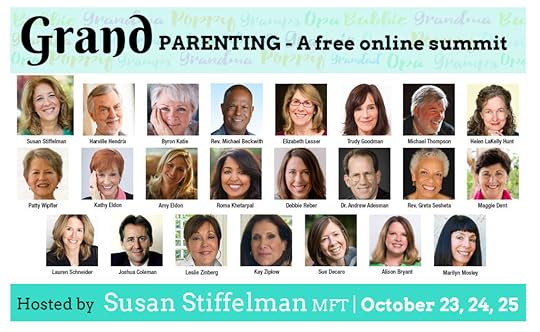
We invite you to join Roma Khetarpal for this free online summit, hosted by Susan Stiffelman.
Parents, do you wish Grandma and Grandpa would…
Respect your wishes about screen time, bedtime and sugary snacks?
Stop offering “helpful” suggestions?
Offer to help more (or less?)
Grandparents, do you wish your adult kids would…
Hear your advice without becoming defensive?
Value your experience and wisdom?
Include you more in your grandkids’ lives?
Parenting author Susan Stiffelman, MFT proudly present a new free series: GRAND Parenting, a telesummit for parents, grandparents, and every member of your grand-family! Along with our own Roma Khetarpal, additional speakers include Byron Katie, Harville Hendrix, Helen Hunt, Elizabeth Lesser, Trudy Goodman, Rev. Michael Beckwith, Maggie Dent Patty Wipfler and a host of exceptional writers, teachers, and experts in the field.
In this summit, you will learn about:
• Setting boundaries without hurting feelings • Offering support without offending • Dealing with “helpful advice” • Staying in touch from far away • Addressing issues of alienation • Multi-generational households • Grandparents raising grandkids • Helping children cope with loss • Paying for extras…or not • Step-grandparenting
Just click here to sign up!
We hope you’ll join us for this incredible event!
The post GRAND Parenting – A Free Online Summit appeared first on Tools of Growth.
October 2, 2018
Mindful Paraeducators’ Lead to Succeed Program
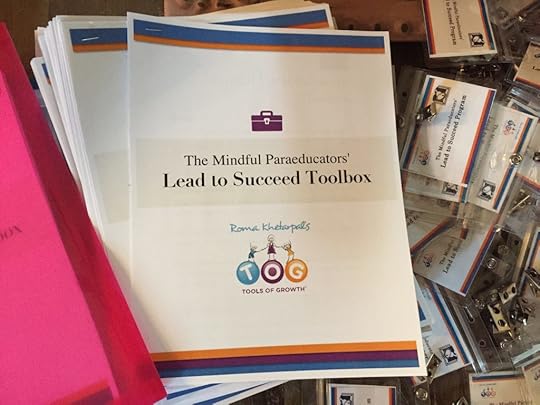
Last week we were proud to conduct our first-ever mindfulness program for paraeducators in the Saugus Union School District. The 171 attendees who work with special-needs kids learned about mindfulness tools drawn from my award-winning book, The “Perfect” Parent: 5 Tools for Using Your Inner Perfection to Connect With Your Kids.
What an incredible session it turned out to be! I was inspired by the passion of this group of professionals and deeply touched by their commitment and dedication to the special-needs children under their care. I came to realize through my observations before the program and the comments about their challenges during the workshop that this position demands astute self-management because special-needs kids are in constant flux. Taking on this workshop was one of the most challenging assignments that I have ever had!
I presented to the paraeducators the importance of their role as contributors to these children’s future, brought them a clear understanding of how our interior world works, and gave them hands-on tools of emotional intelligence, mindfulness, and consciousness to help manage their emotions. That way they could align their love for the children and passion for their work with their actions, behavior, and demeanor while interacting with kids who might easily push one over the edge— unintentionally, of course! I personally was elated to have the opportunity to serve the 1300 children at SUSD through this group of professionals. The reactions and testimonials of the attendees were truly touching. Do check out the videos and comments that we are sharing at the end of this post.
The innovative Lead to Succeed programs bring science-supported tools of mindful communication and emotional intelligence to schools. The workshops are designed to empower, teach, equip, and support teachers, administrators, recess staff, before/after school staff, bus drivers, and paraeducators, and we do careful data mining in advance to customize each program to a particular school district and group.
More than 40,000 students are already benefitting from these programs throughout several Los Angeles school districts. My goal is to reach ALL our educators with these mindfulness techniques so that together we can raise kids with special needs who thrive.
Here are some pictures and testimonial videos from our first paraeducators’ session!
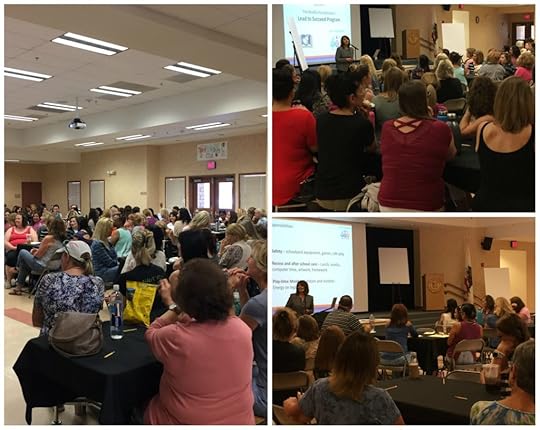
Paraeducators Testimonials
“I realized I needed much more help than I thought. Thank you so much. This was the best conference I ever attended.” – Workshop Attendee
“Very useful tools and tips to deal with strong emotions and disruptive behaviors while using mindfulness and empathy.” – Workshop Attendee
“I received new hope. Tools to use that will come naturally. Things like breathing to keep my mind, emotions in check to help not just my student but to use at home.” – Workshop Attendee
“Great ideas and research shared to empower me and my co-workers to be a mindful, relational paraeducator.” – Workshop Attendee
“Excellent techniques to implement in class. Made me aware of areas I need to improve. I valued the honesty and humor of the speaker.” – Workshop Attendee
The post Mindful Paraeducators’ Lead to Succeed Program appeared first on Tools of Growth.
September 17, 2018
The Parenting Intention

We live in a society that is focused on goal setting and achieving. Whether it is preparing our children for kindergarten, middle school, high school, or college we are on the hamster wheel to help them set and achieve goals that will propel them to the next phase of their lives. From their youngest years, we are caught up in building their “resumes” to get them prepared for success in the world.
These outward goals have their place, but in the race to achieve we often overlook the most obvious building block to their happiness and success—our relationship with them. That relationship is built through day-to-day connections. And connections are made by effective communication while we ride the waves of the celebrations and the challenges of parenting. Unless we hold this intention of building a relationship in our mind’s eye in everything that we do with and for our children, we are bound to have communication breakdowns, which create disconnections that could often be irreparable.
In her powerful book Living With Intent, Mallika Chopra, founder of IntentBlog.com, brings crystal clarity to the difference between goals and intentions. She says that a goal is the actual execution or act of doing something, while an intention is the spiritual and aspiration component of wanting to achieve something. In other words, an intention is the inner state of mind that directs the action, sets the path, the resolution, and the purpose. Originating from the Latin word intendere—to stretch towards, to aim at—an intention is the seed planted in the direction that we desire. For example, if we want to grow a rose, we plant the seeds of a rose plant not those of a sunflower. Similarly, we have to plant the seed—the intention—of what we desire in parenting our children.
We all know that building relationships is more of an inward task than an outward goal. And when it comes to our children, harnessing connections and building a relationship requires a serious inner commitment. Let’s set our parenting intention with an affirmation: “My intention is to build a respectful, sweet, meaningful, and lasting relationship with my child.”
When this intention is at the very core of every interaction with your child, it will help you stay attuned to your kids and connected with them during good times and not so good times. When you drift away, turn back to this intention, and it will pull you back and remind you to return to center. It is this seed of intention that will grow your relationship with your kids. We can now start to prepare the soil in which we’ll plant this seed.
The post The Parenting Intention appeared first on Tools of Growth.

